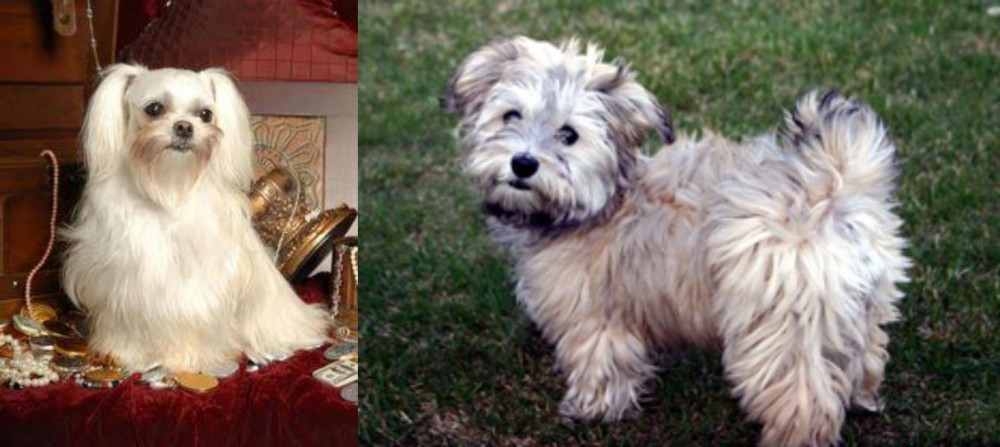 Both Toy Mi-Ki and Havapoo are originated from United States. Toy Mi-Ki may grow 8 cm / 3 inches shorter than Havapoo. Toy Mi-Ki may weigh 7 kg / 15 pounds lesser than Havapoo. Both Toy Mi-Ki and Havapoo has same life span. Both Toy Mi-Ki and Havapoo has almost same litter size. Both Toy Mi-Ki and Havapoo requires Moderate Maintenance.
Both Toy Mi-Ki and Havapoo are originated from United States. Toy Mi-Ki may grow 8 cm / 3 inches shorter than Havapoo. Toy Mi-Ki may weigh 7 kg / 15 pounds lesser than Havapoo. Both Toy Mi-Ki and Havapoo has same life span. Both Toy Mi-Ki and Havapoo has almost same litter size. Both Toy Mi-Ki and Havapoo requires Moderate Maintenance.
Basic Information
undefined
United States
United States
Life Span:
12 - 14 Years
10 - 14 Years
Other Names:
Mikki, Mi-ki
Poovanese, Island Mini Doodle, Havadoodle, Havanesepoo, Havanesedoodle
Colors Available:
white, apricot, Cream, brown, fawn, black - mixed, bi-colors
brown, grey, tan, white, black
Coat:
Long haired or short haired
soft, hypoallergenic fur
Temperament:
Affectionate, Alert, Cheerful, Curious, Energetic, Friendly, Gentle, Independent, Intelligent, Lively, Loving, Loyal, Outgoing, Playful, Protective, Quiet, Responsive, Social, Sweet, Territorial
Affectionate, Energetic, Friendly, Gentle, Intelligent, Loving, Outgoing, Playful
Grooming:
Moderate Maintenance
Moderate Maintenance
New Owners Friendly:
Yes
Yes
History
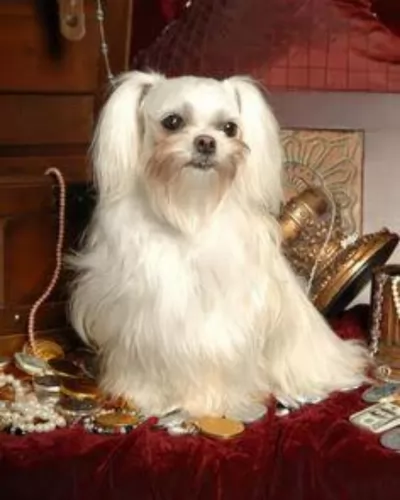 The Toy Mi-Ki is a sociable companion dog. He hasn’t got a long history, and the little bit of history there is, isn’t clear.
The Toy Mi-Ki is a sociable companion dog. He hasn’t got a long history, and the little bit of history there is, isn’t clear.
It is believed that the breed was bought about by Maureen Westburg. It was in the 1980s that she crossed several toy breeds to develop the Mi-Ki. It is thought that she gave the dog the name Mi-Ki because her name was Mikkie. It seems whe wanted a dog that came close to looking like a gremlin.
Some of the dogs used in the breeding program were the Japanese Chin, the Maltese, and the Papillon. The International Miki Registry is trying to get recognition with the United Kennel Club for this dog. There are other canine clubs and organizations that recognize the Mi-Ki Dog as a breed.
The Havapoo is usually a cross with a miniature Poodle and a Havanese but other poodle sizes such as the toy can be used. This is a fairly new cross breed just getting the attention of the American public. The result is a friendly, small dog. They have a striking appearance and lovable personality. They are easy to train and very smart. Not much is know about their heritage except that they were developed in the United States sometime in the past 30 years. Given the long history of the parental breeds, you can count on the quality and beauty of the Havapoo.
Description
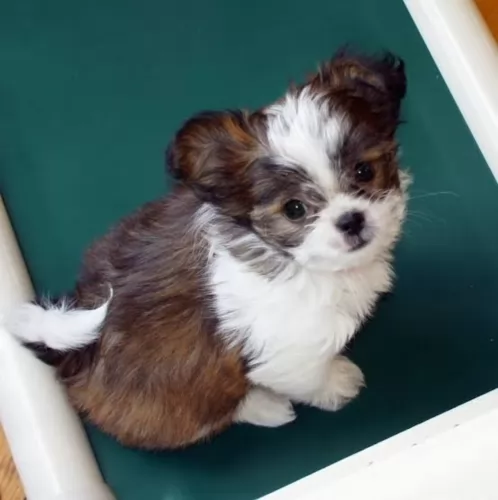 The small Toy Miki stands at between 25 cm – 30 cm in height and weighs between 2 – 5kg. You get two different coat types – long and short and the long-haired variety also has quite a bit of hair around the face.
The small Toy Miki stands at between 25 cm – 30 cm in height and weighs between 2 – 5kg. You get two different coat types – long and short and the long-haired variety also has quite a bit of hair around the face.
His longish coat is low-shedding which makes him popular for people who battle with allergies. The Miki Dog will produce about 2 – 4 puppies.
As a toy dog, he has a domed head with large eyes. Their ears are feathered and are carried erect and the tail is long and feathered.
Temperament:
These little dogs are popular companion dogs and they’re intelligent and loving, making the ideal pet for anyone.
It’s a friendly dog and yet he will bark to alert you of an intruder. Youll take notice because he isn’t the kind of dog that just yaps away.
Children love them and they make great playmates for children who have been taught to be kind and gentle with animals.
Their small size and their adaptable nature make them suitable for city or country living. Sweet and amicable, the social purebred Toy Mi-Ki is everything you want in a companion.
He is loyal and devoted, calm and adaptable. They’re not the kind of dogs to go jogging with you, but nonetheless, he will still need his exercise – walks every day as well as ball games.
The look of the Havapoo is unpredictable in first generation mixes as the puppies can appear like either of the parents. Most however have carried on the facial features of the Havanese. They usually have soft coats with hypoallergenic fur that comes in brown, black, grey, white and tan.
The white dogs tend to be deaf or perhaps even blind.
They are really good looking dogs whichever parent they favor.
Characteristics
 The Mi-Ki is calm and good-natured, and because of his cuteness, he can’t help but become a lap dog, if you allow him.
The Mi-Ki is calm and good-natured, and because of his cuteness, he can’t help but become a lap dog, if you allow him.
He is social and just loves human companionship. He is friendly too and will quite happily be friends with children and pets in the home.
Make sure he is trained and socialized so that you become one of the many people who have nothing but good things to say about this sweet little dog.
1Children friendliness yes but monitor their interaction so the dog does not get hurt.
2.Special talents highly intelligent and love to run
3.Adaptability Home or apartment is fine but would love a fenced yard to run in.
4.Learning ability very high smart and loves to learn
Health Problems
With good care, your Toy Mi-ki can reach 14 years of age, maybe older.
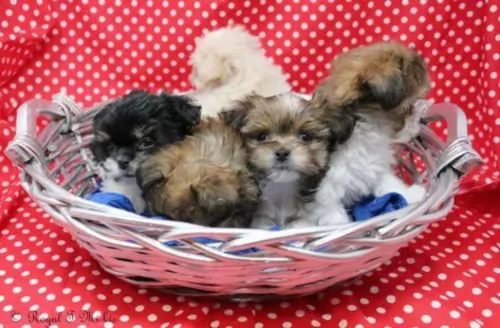 You just have to bear in mind, that because of his short muzzle, he is prone to respiratory problems. Too much exercise and you may find him huffing and puffing. Be careful on a hot day.
You just have to bear in mind, that because of his short muzzle, he is prone to respiratory problems. Too much exercise and you may find him huffing and puffing. Be careful on a hot day.
Also, little dogs like this often have all kinds of dental problems. When you brush him, check his teeth because he can’t tell you if he has a rotten tooth causing him a lot of pain and misery.
Check his eyes too that they are bright and clear and check the inside of his ears. Hypothyroidism and eye issues can also bother the Mi-ki.
Even though first generation mixes have no genetic health issues. There are however some issues they are prone to:
• Deafness - primarily in the white dogs, nothing can be done for it.
• Cataracts – can lead to blindness
• Hypothyroidism – can be medicated
• Hip Dysplasia – can lead to lameness
• Patellar Luxation – can lead to lameness
Caring The Pet
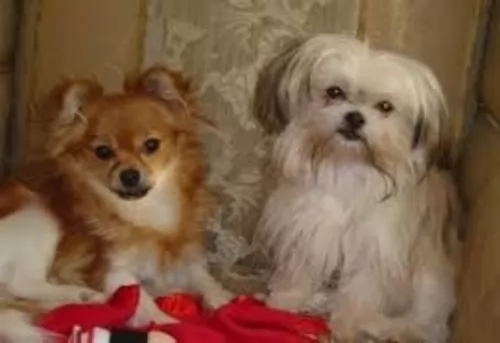 Considered to be low-shedding, the Mi-Ki will benefit from a brush once or twice a week.
Considered to be low-shedding, the Mi-Ki will benefit from a brush once or twice a week.
Some people take their Mi-Ki’s to have their hair professionally cut. This is a good move because then the ears, teeth, and nails are attended to as well.
You can do all of these things at home yourself, but sometimes, particularly with the long-haired Miki, the matting of the hair can make it that you rather send him to professional groomers.
Diet:
Like all dogs, the Mi-Ki dog will need nutritious food if he is to stay healthy. He isn’t a big eater and you will find the perfect food for your small canine pet.
Read on the packaging to make sure you get high-quality dry food for small dogs. You want the ingredients to be as natural as possible without any toxic colorants and additives.
Meat and protein must always be the top ingredients. Try to provide some home-made food too. Boiled chicken, brown rice, spinach, and sweet potatoes can be chopped up finely and a small portion added occasionally to the dry kibble as a tasty treat.
1Feeding the puppy – feed a high quality puppy food for small or toy dogs. Feed 3-4 times a day a total or 1 cup.
2.Feeding the adult - feed a high quality puppy food for small or toy dogs. Feed 3-4 times a day a total of 2 cups
3.Points for Good Health – overall good health
4. Games and Exercises – needs some moderate exercise and would love a fenced yard to run in. Will play fetch and some are good at agility.
Comparison with other breeds
- Havapoo vs English Bulldog - Breed Comparison
- Havapoo vs German Shepherd - Breed Comparison
- Havapoo vs Golden Retriever - Breed Comparison
- Havapoo vs Labrador Retriever - Breed Comparison
- Havapoo vs West Highland White Terrier - Breed Comparison
- Havapoo vs French Bulldog - Breed Comparison
- Havapoo vs Beagle - Breed Comparison
- Havapoo vs Yorkshire Terrier - Breed Comparison
- Havapoo vs Poodle - Breed Comparison
- Havapoo vs Rottweiler - Breed Comparison
- Havapoo vs Boxer - Breed Comparison
- Havapoo vs English Pointer - Breed Comparison
- Havapoo vs Siberian Husky - Breed Comparison
- Havapoo vs Doberman Pinscher - Breed Comparison
- Havapoo vs American Bully - Breed Comparison
- Havapoo vs Abruzzenhund - Breed Comparison
- Havapoo vs Affenpinscher - Breed Comparison
- Havapoo vs Afghan Hound - Breed Comparison
- Havapoo vs Aidi - Breed Comparison
- Havapoo vs Airedale Terrier - Breed Comparison
- Havapoo vs Akbash Dog - Breed Comparison
- Havapoo vs Akita - Breed Comparison
- Havapoo vs Africanis - Breed Comparison
- Havapoo vs Askal - Breed Comparison
- Havapoo vs Atlas Terrier - Breed Comparison
- Toy Mi-Ki vs English Bulldog - Breed Comparison
- Toy Mi-Ki vs German Shepherd - Breed Comparison
- Toy Mi-Ki vs Golden Retriever - Breed Comparison
- Toy Mi-Ki vs Labrador Retriever - Breed Comparison
- Toy Mi-Ki vs West Highland White Terrier - Breed Comparison
- Toy Mi-Ki vs French Bulldog - Breed Comparison
- Toy Mi-Ki vs Beagle - Breed Comparison
- Toy Mi-Ki vs Yorkshire Terrier - Breed Comparison
- Toy Mi-Ki vs Poodle - Breed Comparison
- Toy Mi-Ki vs Rottweiler - Breed Comparison
- Toy Mi-Ki vs Boxer - Breed Comparison
- Toy Mi-Ki vs English Pointer - Breed Comparison
- Toy Mi-Ki vs Siberian Husky - Breed Comparison
- Toy Mi-Ki vs Doberman Pinscher - Breed Comparison
- Toy Mi-Ki vs American Bully - Breed Comparison
- Toy Mi-Ki vs Abruzzenhund - Breed Comparison
- Toy Mi-Ki vs Affenpinscher - Breed Comparison
- Toy Mi-Ki vs Afghan Hound - Breed Comparison
- Toy Mi-Ki vs Aidi - Breed Comparison
- Toy Mi-Ki vs Airedale Terrier - Breed Comparison
- Toy Mi-Ki vs Akbash Dog - Breed Comparison
- Toy Mi-Ki vs Akita - Breed Comparison
- Toy Mi-Ki vs Africanis - Breed Comparison
- Toy Mi-Ki vs Askal - Breed Comparison
- Toy Mi-Ki vs Atlas Terrier - Breed Comparison
 Petzlover
Petzlover Both Toy Mi-Ki and Havapoo are originated from United States. Toy Mi-Ki may grow 8 cm / 3 inches shorter than Havapoo. Toy Mi-Ki may weigh 7 kg / 15 pounds lesser than Havapoo. Both Toy Mi-Ki and Havapoo has same life span. Both Toy Mi-Ki and Havapoo has almost same litter size. Both Toy Mi-Ki and Havapoo requires Moderate Maintenance.
Both Toy Mi-Ki and Havapoo are originated from United States. Toy Mi-Ki may grow 8 cm / 3 inches shorter than Havapoo. Toy Mi-Ki may weigh 7 kg / 15 pounds lesser than Havapoo. Both Toy Mi-Ki and Havapoo has same life span. Both Toy Mi-Ki and Havapoo has almost same litter size. Both Toy Mi-Ki and Havapoo requires Moderate Maintenance.  The Toy Mi-Ki is a sociable companion dog. He hasn’t got a long history, and the little bit of history there is, isn’t clear.
The Toy Mi-Ki is a sociable companion dog. He hasn’t got a long history, and the little bit of history there is, isn’t clear. The small Toy Miki stands at between 25 cm – 30 cm in height and weighs between 2 – 5kg. You get two different coat types – long and short and the long-haired variety also has quite a bit of hair around the face.
The small Toy Miki stands at between 25 cm – 30 cm in height and weighs between 2 – 5kg. You get two different coat types – long and short and the long-haired variety also has quite a bit of hair around the face. The Mi-Ki is calm and good-natured, and because of his cuteness, he can’t help but become a lap dog, if you allow him.
The Mi-Ki is calm and good-natured, and because of his cuteness, he can’t help but become a lap dog, if you allow him. You just have to bear in mind, that because of his short muzzle, he is prone to respiratory problems. Too much exercise and you may find him huffing and puffing. Be careful on a hot day.
You just have to bear in mind, that because of his short muzzle, he is prone to respiratory problems. Too much exercise and you may find him huffing and puffing. Be careful on a hot day. Considered to be low-shedding, the Mi-Ki will benefit from a brush once or twice a week.
Considered to be low-shedding, the Mi-Ki will benefit from a brush once or twice a week.